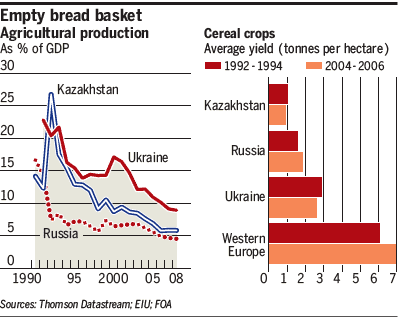|
|
||||||||
|
|
IKAR in Mass MediaBusiness eyes Ukraine's fertile land23 июня 2008 года
"Look at the colour, what a beautiful crop," says Richard Spinks, pointing to wheat and rapeseed fields that his company sowed this season in western Ukraine. "If all of Ukraine's farms could produce the yields we are getting, this country could play a big role in feeding the world and establish itself as a geopolitical power," says the British chief executive of London-listed Landkom. EDITOR'S CHOICEIn depth: Food prices - Jun-02Landkom's business model is simple: lease inefficiently farmed land and apply western fertilisers and irrigation. With Ukraine's grain yield about 35 per cent of western Europe's, there is plenty of scope to improve returns. Landkom, which raised just over $100m on Aim, London's junior stock market, last year, has leased more than 100,000 hectares. And it is just one of of a growing number of agribusinesses that sees profit in Ukraine. Leading grain and oilseed trading companies, such as Cargill and Toepfer, tiptoed into the market in the 1990s and today play a big role exporting grain. With food prices skyrocketing because of rising global demand and poor harvests, their timing looks perfect. "Ukraine is not part of the problem; it's a part of the solution for food supplies," Jean Lemierre, the outgoing head of the European Bank for Reconstruction and Development, said in Kiev last month. With investment and the right technology, Ukraine could "double or even triple" output, filling one-seventh of world production, says Yuriy Melnyk, agriculture minister. So far less than $3bn has been invested into Ukrainian agriculture since 1991, according to government figures. Domestic producers are just starting to raise funds on international stock markets. Renaissance Capital, an investment bank, says $628m in new equity has been raised since August 2006. Yuriy Kosyuk, chief executive of MHP, a leading Ukrainian poultry and agriculture group, says $27bn (€17bn, £14bn) could be invested in the country's agriculture over the next 15 years, and not just grain. "Ukraine could within several years become a significant exporter of meat, foremost to Europe." Whether that happens depends on the pace of reform in Ukraine's fractious parliament. It is illegal to sell agricultural land, most of which is owned by millions of cash-strapped rural farmers. An increasingly vociferous reform lobby is pushing hard to lift restrictions next year. "Companies are competing fiercely for this land today and we see more and more players. If the moratorium is lifted, there will be a big rush for land in Ukraine," Mr Yarmak said. But politicians say poor smallholders must be protected from exploitation at the hands of unscrupulous businesses that would buy the land at a fraction of its real value. Andriy Yarmak, a farming expert, says the real boom will come when legislators sanction the sale of agricultural land. With ownership rights secure, investment and productivity will surge. Protectionism has also been a concern. Kiev has limited grain exports in recent years to keep domestic bread prices down. As a result, farmers turned to exportable crops such as rapeseed, used in biofuel production. But with Ukraine joining the World Trade Organisation this year, restrictions are to be lifted. One of the things that attracts foreign investors to Ukraine is the ease with which the harvest can be exported to the European Union via rail or Black Sea ports. Investors have been leasing land in the hope that they will be at the front of the queue to buy it or sell on the leases at a profit. Annual lease prices doubled to $60-$80 per hectare last year. Renaissance Capital, which has leased 300,000 hectares of land with the intention of re-selling the leases, forecasts they will double again this year. Meanwhile, favourable weather and the rising investment should deliver 40m tonnes of grain this season, up from last year's drought-affected harvest of 29m tonnes. About 14m tonnes of grain is earmaked for export, up from a meagre 2.4m tonnes last year.  Copyright The Financial Times Limited 2008 Source: Financial Times | #grain #oilseeds | Comments: 0 Views: 297
|

|
© 2002—2025 IKAR. Institute for Agricultural Market Studies 24, Ryazansky str., off. 604, Moscow, Russia Tel: +7 (495) 232-9007 www@ikar.ru |
|
|
|
Language: Russian Google translate:


